Popularly known as Ethiopia’s expert weavers and renowned builders of towering huts, the Dorze people are a small Omotic-speaking ethnic group belonging to the larger Afro-Asiatic language family living in the Gamo highlands of the southern region of Ethiopia. They are among the most lively ethnic group of the famous Omo Valley tribe.
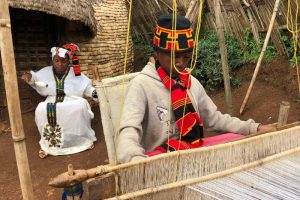 The Dorze people have an estimated population of about 30,000 people living in the villages near the cities of Chencha and Arba Minch in the Semien Omo Zone of the Southern Nations, Nationalities, and people region ( formerly in the Gamu-Gofa province) and their residence stretches from the Omo River banks to the highlands over Lake Abaya. They bordered with the people who inhabit the Gamo highland in the east with Otchollo people who live on the top of the hill of Gamo highland.
The Dorze people have an estimated population of about 30,000 people living in the villages near the cities of Chencha and Arba Minch in the Semien Omo Zone of the Southern Nations, Nationalities, and people region ( formerly in the Gamu-Gofa province) and their residence stretches from the Omo River banks to the highlands over Lake Abaya. They bordered with the people who inhabit the Gamo highland in the east with Otchollo people who live on the top of the hill of Gamo highland.
A Curious Tribe With a Fascinating History
The history of the Dorze people is not much documented. However, all the available anthropological and linguistic sources all point to the fact that the Dorze tribe had lived in the areas of Gamo highland in Ethiopia’s Omo Valley for centuries before the conquest of Menelik II in the late nineteenth century. It has been suggested by German ethnologist, Helmut Straube that the culture of Dorze may be a blend of the cultures of different groups in the region.
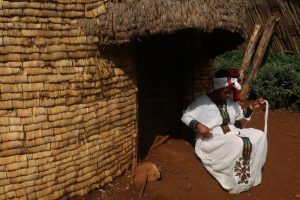 The first group consisted of over 20 clans who claimed that they have lived permanently in the Dorze homeland or come from neighboring Ometo speaking areas while the other group which consisted of three clans also claimed to be migrated from the part of the Ethiopian empire during the first Christian Amhara invasion which was said to have happened in the fifteenth and sixteenth centuries.
The first group consisted of over 20 clans who claimed that they have lived permanently in the Dorze homeland or come from neighboring Ometo speaking areas while the other group which consisted of three clans also claimed to be migrated from the part of the Ethiopian empire during the first Christian Amhara invasion which was said to have happened in the fifteenth and sixteenth centuries.
The traditions of migration and claiming of origin from the north is also widespread among the Dorze. Although it is an established tradition in Ethiopia to trace one’s origin from the north, the Dorze interestingly have some important evidence to explain their claims.
Southern Ethiopia’s Most Famous Cotton Weavers
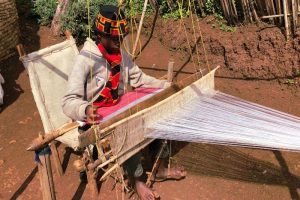 The Ethiopian tribe of Dorze are best known for their cotton weaving and tall beehive-shaped dwellings which are some of the most distinctive in Africa. Every compound is self-sufficient and is surrounded by a smallholding of crops, and inside each compound is their remarkable domed dwelling made from false banana leaves. Historically, these people were once much-feared warriors but nowadays, their men have settled down to farming or engage in weaving.
The Ethiopian tribe of Dorze are best known for their cotton weaving and tall beehive-shaped dwellings which are some of the most distinctive in Africa. Every compound is self-sufficient and is surrounded by a smallholding of crops, and inside each compound is their remarkable domed dwelling made from false banana leaves. Historically, these people were once much-feared warriors but nowadays, their men have settled down to farming or engage in weaving.
Untouched by mass markets and fashion trends, visitors are often impressed by the beautiful artisan work and the truly original craftsmanship of the Hand-woven cotton textiles and garments of the Dorze people. In fact, their cotton-weaving prowess is so revered that the name Dorze is used as a synonym for weaving in the Ethiopian capital of Addis Ababa. The Dorze tribe wear colorful toga robes called shammas which are very popular throughout Ethiopia.
Dorze Village Life
Their hut is made up of hardwood poles, woven bamboo, inset, and other natural materials. These huts can stand up to two stories tall and can last up to 80 years. You can find a fireplace, a seating area, and bedrooms inside the main hut. Smaller huts include guest houses, a workshop, a kitchen, and even cattle shed. When their huts are attacked by termites, they can easily remove it from its foundation and relocate it. This shortens the height of the hut but it also allows it to last much longer.
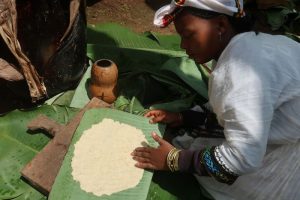 The Dorze people cultivate their food and prevent erosion by terracing along the mountainside. They farm spices, fruits, vegetables, and tobacco within their compound. Much of the responsibilities in the family are handled by the women of the Dorze tribe. They take care of the children and do all the house chores. They are also responsible for cooking, spinning cotton, and collecting firewood while the men spend most of their time on the farm or building huts.
The Dorze people cultivate their food and prevent erosion by terracing along the mountainside. They farm spices, fruits, vegetables, and tobacco within their compound. Much of the responsibilities in the family are handled by the women of the Dorze tribe. They take care of the children and do all the house chores. They are also responsible for cooking, spinning cotton, and collecting firewood while the men spend most of their time on the farm or building huts.
Religious Beliefs
Before the introduction of Christianity into the Gamo highlands, the Dorze people had traditional beliefs. They believed in a supreme being and creator called Tawa. Tawa was believed to be the creator of the world and everything in it and he punishes the evil and blesses the good. As one of the older Ethiopian tribes, the Dorze people had beliefs in diviners (Maro) to solve problems when serving as a mediator between man and Tawa. they also believed that the spirits of gods and goddesses might have dwelled in stones, trees, domestic animals, the songs of birds, the roaring of hyenas, etc.
Want to Visit the Dorze People of Ethiopia?
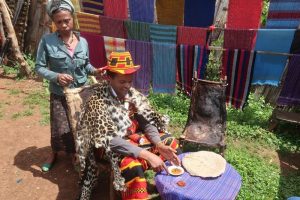 The Dorze people are renowned for their hand-woven cotton garments and there is also an opportunity to observe the process of making kotcho in some Dorze villages across Ethiopia. Tourists can catch a glimpse of this process towards the town of Arba-Minch. You are guaranteed to have a great time and learn a lot from these highly skilled weavers and builders of towering huts.
The Dorze people are renowned for their hand-woven cotton garments and there is also an opportunity to observe the process of making kotcho in some Dorze villages across Ethiopia. Tourists can catch a glimpse of this process towards the town of Arba-Minch. You are guaranteed to have a great time and learn a lot from these highly skilled weavers and builders of towering huts.
Curious about Ethiopia? Check out some of our tours below:
- 16 Days Omo Valley, Awash Park, and Harar
- 14 Days Historic Route with Omo Valley
- Omo Valley Cultural Express Tour
- 6 Days Omo Valley Highlights











